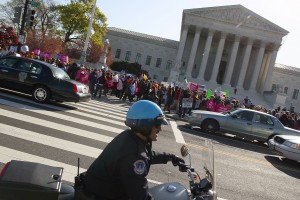Every news organization in the country is busy parsing the Supreme Court today and State of Health is no exception. But if you're tired of arcane discussions of the Commerce Clause, the individual mandate and (heaven forbid) the 1867 Tax Anti-Injunction Act, read on.
In a "Health Law Hearings Wrap Up" this morning on KQED's Forum, I perked up when the guests got going on how much to read into the justices' questions. These are not the first legal experts to focus on Justice Kennedy, the perceived swing vote, who asked many tough questions of the attorney defending the government's position on the constitutionality of the health care law.
But Vikram Amar, professor at the UC Davis School of Law urged caution in trying to analyze the questions too closely. "Justice Kennedy at some points in the past asked very tough questions of the government and ended up not striking down the law in question," he said.
But when the topic turned to the possibility of politics rearing its head in the courtroom, the discussion heated up.
Now, the casual observer of California politics may be aware that San Francisco leans left, politically. Friends of mine have expressed a grave concern that the justices will decide this case on partisan grounds. Indeed, Amar expressed the same fear. "I will be dismayed if the law is struck down by a 5-to-4 vote between justices who were appointed by Republican versus Democratic presidents," Amar said. "I think that will corroborate a suspicion that a lot of people have -- that I've spent my life trying to rebut -- that constitutional law and partisan politics are one and the same."
